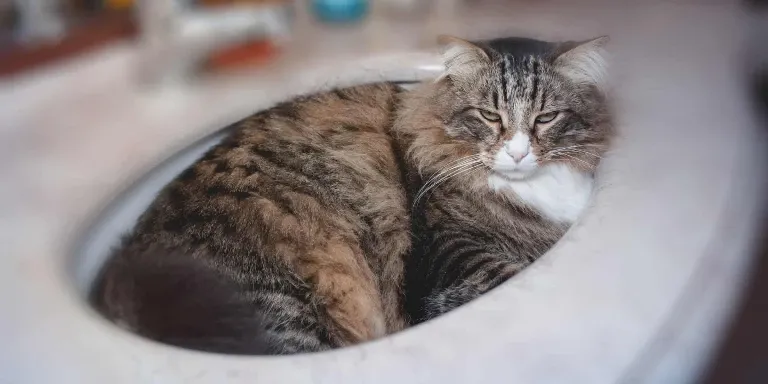The Best Fluffy Pancakes recipe you will fall in love with. Full of tips and tricks to help you make the best pancakes.

As a new kitten owner, you may be wondering if it’s okay to leave your furry friend alone. While it’s important to spend quality time with your kitten, there are times when you may need to step out of the house without them.
It is not recommended to leave a kitten alone for extended periods of time, especially if they are very young. Kittens require attention, care, and socialization. If you need to leave your kitten alone, make sure they have a safe and comfortable space with food, water, and a litter box. It is best to gradually increase the amount of time they are left alone as they grow older and more independent.
However, before leaving your kitten alone, it’s essential to understand their needs and how long they can tolerate being by themselves.
Kittens require a lot of attention, care, and socialization to grow into healthy and happy cats. Leaving them alone for too long or too frequently can lead to behavioral problems, anxiety, and stress.
In this article, we’ll explore how long you can leave your kitten alone, how to train them for alone time, signs of distress to watch for, and alternatives to leaving them alone.
By understanding your kitten’s needs and taking the necessary steps, you can ensure they stay safe, healthy, and happy even when you’re not around.
Understanding Your Kitten’s Needs
Your kitten’s needs are important, so you can’t just leave them alone without proper care and attention. Understanding kitten behavior is essential in taking care of them.
Kittens need attention and care to develop a healthy and happy lifestyle. Leaving them alone for extended periods can cause separation anxiety, which can lead to destructive behavior and health problems. Kittens are social animals, and they need love and attention to thrive.
Understanding their needs and providing them with the necessary care and attention is essential for their development. Kittens need social interaction with their owners, playtime, and a proper diet to grow healthy and happy. Leaving them alone for too long can cause stress and anxiety, leading to destructive behavior and health problems.
Separation anxiety in kittens is common, and it can cause a lot of problems if left unattended. Symptoms of separation anxiety include excessive vocalization, destructive behavior, and litter box issues. To avoid these problems, make sure to spend quality time with your kitten and provide them with toys and activities to keep them occupied when you’re not around.
Proper care and attention will help your kitten develop into a healthy and happy cat.
How Long Can You Leave Your Kitten Alone?
Wondering how long your adorable new furball can fend for themselves? As much as you may want to spend every moment with your kitten, it’s important to understand how long they can be left alone.
Kittens require a lot of attention during their early stages of development, and leaving them alone for too long can result in various negative outcomes. The importance of socialization cannot be overstated when it comes to kittens.
Kittens who are left alone for extended periods may become fearful and anxious around strangers and other pets. They may also develop destructive behaviors, such as scratching furniture or chewing on household items. Socialization helps your kitten become comfortable with their surroundings and the people and animals around them, reducing the likelihood of these behaviors.
Separation anxiety in kittens is a real concern, and leaving your kitten alone for too long can exacerbate it. Kittens who experience separation anxiety may become clingy and overly dependent on their owners, leading to behavioral issues.
It’s important to gradually acclimate your kitten to being alone for short periods, such as a few hours at a time, and gradually increase the duration as they become more comfortable. By doing so, you can help your kitten develop confidence and independence, while also ensuring they remain happy and healthy.
Tips for Leaving Your Kitten Alone
When leaving your kitten alone, it’s important to provide a safe and secure environment for them to roam around in. Ensure that all potential hazards are removed and that they have access to a comfortable space to rest in.
Additionally, make sure that there is adequate food and water available for your kitten, as well as toys and entertainment to keep them occupied while you’re away. By taking these steps, you can feel confident that your kitten will be happy and healthy in your absence.
Providing a Safe and Secure Environment
Creating a safe and secure environment for your kitten is crucial in ensuring their well-being when you’re not around. Follow these tips to provide a comfortable and secure space for your furry friend:
- Creating a cozy space: Provide a space that’s comfortable, warm, and cozy for your kitten to sleep in. You can use a soft, warm bed or a cozy blanket to make them feel at home. Place the bed in a quiet corner of the house where your kitten can relax and sleep undisturbed.
- Introducing your kitten to the environment: Before leaving your kitten alone, make sure they’re familiar with their surroundings. Show them around the house and let them explore their new environment. This will help them feel more comfortable and safe in their new space.
- Preparing for emergencies and having a backup plan: In case of any emergency, make sure you have a backup plan in place. Keep a list of emergency contacts and veterinary services handy, in case you need to take your kitten to the vet. Additionally, consider getting a pet monitoring system that can keep an eye on your kitten when you’re not around.
By following these tips, you can create a safe and secure environment for your kitten when you’re not around. This will not only ensure their well-being but also give you peace of mind when you have to leave them alone.
Leaving Adequate Food and Water
To make sure your furry friend stays healthy and hydrated, you’ll need to provide enough food and water for them to last until you return. The importance of portion control can’t be overstated, especially for kittens who are still growing and developing.
Overfeeding can lead to obesity and other health issues, while underfeeding can stunt their growth and development. Choosing the right feeding schedule is also crucial.
Kittens should be fed small, frequent meals throughout the day to help regulate their digestion and prevent overeating. As a general rule, kittens need to eat about 3-4 times a day, with each meal consisting of about 1/4 to 1/3 cup of kitten food.
Be sure to read the feeding instructions on the food package, as different brands and types may have different recommendations. With the right portion control and feeding schedule, you can ensure that your kitten is getting the nutrition and hydration they need, even when you’re not around.
Providing Toys and Entertainment
Keeping your kitten entertained with engaging toys is essential to their well-being and happiness. Kittens are naturally curious creatures and they need to explore their surroundings to develop their senses. Providing toys that stimulate their senses, such as toys with different textures, sounds, and movements, will keep them engaged and prevent them from getting bored.
Interactive playtime with your kitten is also important to build a strong bond between you and your furry friend. In addition to providing toys, it’s also important to socialize your kitten and give them plenty of human interaction. Kittens that are well-socialized are more confident, friendly, and adaptable to new situations.
Spending time with your kitten, playing with them, and cuddling them will not only keep them entertained but also help them to feel loved and secure. As a responsible pet owner, it’s important to prioritize your kitten’s mental and physical well-being by providing them with a stimulating and loving environment.
Training Your Kitten for Alone Time
While it may be difficult at first, acclimating your kitten to alone time is important for their growth and independence. Creating a routine and gradually training your kitten to be comfortable on their own can help to prevent separation anxiety and destructive behavior.
Here are some tips for introducing your kitten to independence:
- Start small: Begin by leaving your kitten alone for short periods of time and gradually increase the duration as they become more comfortable.
- Provide a safe space: Make sure your kitten has access to a comfortable, secure place to rest while you’re away.
- Use positive reinforcement: Reward your kitten with treats and praise when they exhibit calm behavior during alone time.
- Seek professional help: If your kitten continues to struggle with alone time, consider consulting with a veterinarian or animal behaviorist for additional guidance.
Remember, training your kitten for alone time is a process that requires patience and consistency. With time and effort, you can help your kitten develop the independence they need to thrive.
Signs of Distress in Your Kitten
When you leave your kitten alone, it’s important to know the signs of distress to ensure their well-being. Look out for behavioral signs such as excessive meowing, scratching, or destructive behavior.
Physical signs like panting, vomiting, or diarrhea can also indicate distress. If you notice any signs, it’s important to take action by providing a safe and comfortable environment or seeking professional help from a veterinarian.
Behavioral Signs
If your kitten is showing signs of distress, like excessive meowing or destructive behavior, it may not be wise to leave them alone for extended periods of time. Understanding kitten anxiety is important, as it can help you recognize the signs of distress and prevent any potential harm to your furry friend.
Managing kitten separation anxiety can be challenging, but with patience and proper care, you can help your kitten feel safe and comfortable even when they’re left alone. To help alleviate your kitten’s anxiety, here are a few behavioral signs to look out for:
- Excessive meowing or whining, which may indicate that your kitten is anxious and seeking attention.
- Hiding or running away, which may suggest that your kitten is scared or uncomfortable in their surroundings.
- Destructive behavior such as scratching or chewing, which can be a sign of stress or boredom.
By keeping an eye out for these behaviors and taking steps to alleviate your kitten’s anxiety, you can help ensure that your furry friend is happy, healthy, and safe even when you’re not around. Remember, with patience, care, and attention, you can help your kitten feel secure and comfortable even when they’re alone.
Physical Signs
Recognizing physical signs of anxiety in your kitten is crucial to ensuring their overall well-being. Cats are social animals and can experience separation anxiety when left alone for extended periods. If you notice your kitten displaying unusual behaviors, such as excessive grooming or loss of appetite, it may indicate that they are feeling lonely or anxious.
One physical sign of separation anxiety in kittens is excessive meowing or vocalization. They may also become destructive by scratching furniture or knocking over items. If you notice these behaviors, it’s important to address them to alleviate your kitten’s anxiety.
Providing them with toys, hiding treats around the house, or playing soothing music can help ease their stress and keep them entertained while you are away. Remember, a happy and healthy kitten is a well-cared-for kitten.
What to Do When You Notice Distress
If you notice any physical signs of distress when leaving your kitten alone, it’s important to take action. But what should you do when you notice these symptoms?
The first step is to recognize separation anxiety in your kitten. This can be difficult to do, as kittens may exhibit different behaviors depending on their personality and background. However, some common signs of separation anxiety include excessive meowing, destructive behavior, and refusing to eat or drink when left alone.
If you suspect your kitten is experiencing separation anxiety, it’s important to address the issue as soon as possible. One option is to find a professional trainer who specializes in working with cats. They can help you develop a training plan that will gradually teach your kitten to feel more comfortable being alone. Additionally, they can provide advice on how to create a calm and safe environment for your kitten, which may help reduce their anxiety.
By taking proactive steps to address separation anxiety, you can help ensure that your kitten feels secure and happy even when you’re not around.
Alternatives to Leaving Your Kitten Alone
If you’re concerned about leaving your kitten alone, there are several alternatives to consider.
One option is to hire a pet sitter who can come and check on your kitten while you’re away.
Another option is cat boarding, where your kitten can stay in a safe and secure environment with other feline friends.
You could also ask a friend or family member for help if they’re available. However, it’s important to consider how long your kitten can be left alone overnight or for a weekend, as they may require more frequent care and attention.
Hiring a Pet Sitter
Hiring a pet sitter is like having a guardian angel for your furry friend while you’re away. Here are some benefits of hiring a pet sitter:
- Your kitten can stay in the comfort of their own home, reducing stress and anxiety.
- A pet sitter can provide one-on-one attention and playtime with your kitten.
- Pet sitters can also provide basic care, such as feeding and litter box cleaning.
- Hiring a pet sitter can give you peace of mind knowing that your kitten is in good hands.
When considering the cost of hiring a pet sitter, it’s important to weigh the benefits against the expenses. The cost of a pet sitter can vary depending on factors such as location, length of visit, and additional services requested. However, the cost of hiring a pet sitter can often be less than the cost of boarding your kitten or dealing with potential damage to your home if your kitten is left alone for extended periods of time.
Overall, hiring a pet sitter can be a great option for those who want to ensure their kitten is well-cared for while they are away.
Cat Boarding
Now that you know about hiring a pet sitter, let’s talk about another option for when you need to leave your kitten alone: cat boarding.
Cat boarding allows your furry friend to stay in a safe and comfortable environment while you are away. Finding a reliable pet sitter can be difficult, but with cat boarding, you can have peace of mind knowing that your kitten is being taken care of by professionals.
When looking for a cat boarding facility, make sure to do your research and find a place that is clean, safe, and has knowledgeable staff. You should also check if they have any special requirements or restrictions for your kitten, such as vaccinations or specific food preferences.
Additionally, make sure to book in advance as boarding facilities can fill up quickly, especially during peak vacation seasons. With cat boarding, you can rest easy knowing your kitten is in good hands while you are away.
Asking a Friend or Family Member for Help
Asking a friend or family member to take care of your feline friend is a great way to save money on pet care expenses. However, it’s important to find someone who’s willing and able to provide the necessary care for your kitten.
Here are some tips on asking for help and finding alternatives:
- Make sure to ask someone who’s reliable and responsible, and who has experience with cats.
- Provide clear instructions on feeding, litter box cleaning, and any other necessary tasks.
- Consider offering a small payment or gift as a thank you for their help.
If you cannot find anyone to help, consider hiring a pet sitter or using a pet care service.
Ensure that your kitten is comfortable with the person taking care of them before leaving them alone.
Finding someone to take care of your kitten can be a stressful process, but with these tips, you can make sure your feline friend is in good hands while you’re away. Remember to always plan ahead and have a backup plan in case your first choice falls through.
By taking the time to find a reliable caregiver, you can rest assured that your kitten is happy and healthy even when you’re not there.
Can Kittens Be Left Alone Overnight?
You may be surprised to learn that many kittens can safely spend the night alone without human supervision. In fact, according to a recent survey, over 80% of kitten owners report leaving their furry friends alone overnight at least once a month.
However, it’s important to note that leaving kittens unattended for extended periods of time can lead to separation anxiety and other behavioral issues. To prevent separation anxiety, it’s recommended to gradually introduce your kitten to alone time by leaving them alone for short periods of time and gradually increasing the duration.
Additionally, it’s important to ensure that your kitten has access to plenty of food, water, and a clean litter box before leaving them alone overnight. With proper preparation and training, many kittens can safely and comfortably spend the night alone. However, it’s always a good idea to have a trusted friend or family member check on your kitten if possible.
Can Kittens Be Left Alone for a Weekend?
If you’re planning to be away for a weekend, it’s important to make sure your kitten has enough food, water, and a clean litter box to last the duration of your absence. However, it’s not recommended to leave your kitten alone for an entire weekend.
Kittens can experience separation anxiety, which can lead to destructive behavior or even health problems. To avoid leaving your kitten alone for too long, consider finding a reliable caregiver. This can be someone you trust, such as a family member or friend, who can check in on your kitten regularly.
Alternatively, you can hire a professional pet sitter or board your kitten at a reputable cat hotel. By taking these steps, you can ensure your kitten is well-cared for and happy while you’re away.
Can Kittens Be Left Alone with Other Pets?
Leaving kittens with other pets can be a great way to socialize them, though some pet owners may worry about how their animals will get along. If you’re planning on introducing a new pet to your kitten, it’s important to do so gradually and under close supervision. This can help prevent any potential conflicts and ensure a smooth transition for both pets.
Here are some tips for managing separation anxiety when leaving your kitten alone with other pets:
- Start with short periods of time: Leave your kitten alone with the other pet for short periods of time, gradually increasing the length of time as they become more comfortable with each other.
- Provide separate spaces: Make sure each pet has their own separate space, such as a crate or room, where they can retreat to if they feel overwhelmed or need some alone time.
- Reward good behavior: When your pets interact positively with each other, reward them with treats or praise. This can help reinforce good behavior and encourage them to continue getting along.
Should I Leave My Kitten Alone Before or After Bathing?
It’s best to leave your kitten alone before bathing them, to allow them to calm down and feel less stressed. Once they are settled, you can start bathing kittens safely by using a gentle shampoo and warm water, and make sure to thoroughly dry them afterwards to prevent them from getting too cold.
Conclusion
In conclusion, leaving your kitten alone for extended periods of time can cause distress and anxiety, which can lead to behavioral problems in the long run. It’s important to understand your kitten’s needs and provide them with the necessary attention and care.
If you must leave your kitten alone, make sure to take the necessary precautions and provide them with a safe and comfortable environment. For example, a friend of mine had to leave her kitten alone for several hours each day due to work commitments. She provided her kitten with plenty of toys, a comfortable bed, and a designated area for litter and food. She also made sure to spend quality time with her kitten when she was home, playing with her and giving her attention.
As a result, her kitten was able to adjust to being alone and did not exhibit any signs of distress or behavioral problems. Remember to always prioritize your kitten’s well-being and provide them with the necessary care and attention they need.
With proper training and preparation, your kitten can learn to be comfortable with alone time and thrive in a loving and nurturing environment.








